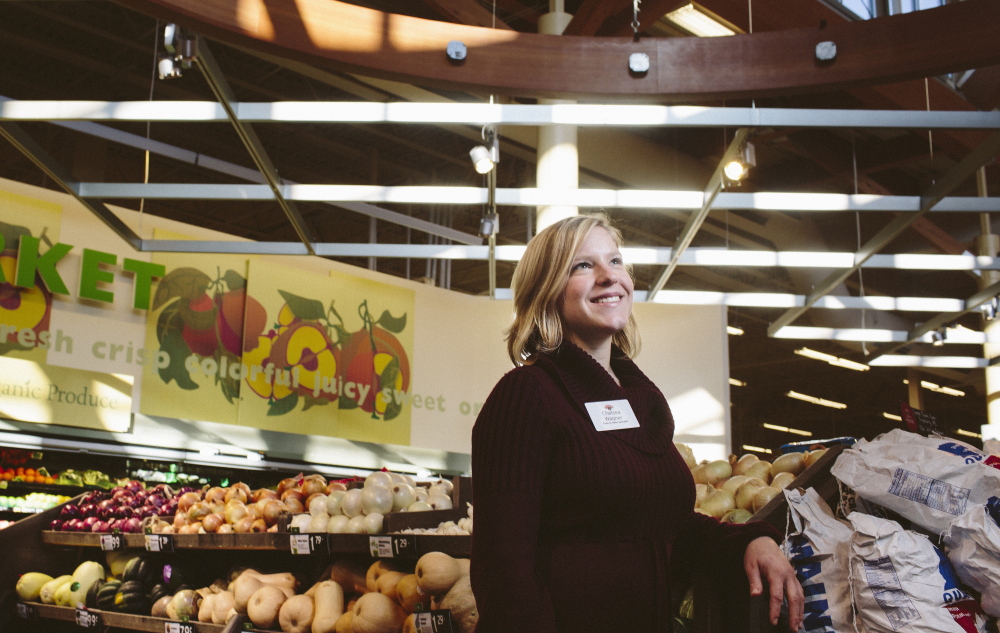Meet Chelsea Wagner, a specialist in Hannaford’s Close to Home department, the folksy name for the program that brings local foods to the supermarket chain. We asked Wagner to tell us how she landed her job – at 23 no less – why one Hannaford might have something and another not and about big plans the chain has afoot to make it easier – financially – for farmers and value-added producers to sell their foods at Hannaford.
LOOK CLOSELY: Hannaford, which let’s not forget, started as a produce cart on the Portland waterfront in 1883, is seriously committed to its local program. The supermarket chain sells nearly 1,500 products from Maine farmers and food producers. Throughout New England, 5,000 products from the Northeast are available at Hannafords. Those numbers reflect just the branded products; that count doesn’t include high-volume items like potatoes, fresh seafood, broccoli and milk that happen to be produced in Maine but aren’t touted as such, as well as some obvious Maine items, like say, lobster. Hannaford would rather undercount than overcount its local numbers. Find the branded items by looking for the label “Close to Home” on the shelves below the products. “It’s under the price tag,” Wagner said.
ORGANIC FARMER: Wagner grew up in Orono and she didn’t stray far for college, studying biology at the University of Maine. “I went to college there because it was a great school,” she said, “and inexpensive for me.” Although she didn’t come from a family of farmers or chefs, she was interested in local foods. After college, she went right to a farm as an apprentice through the Maine Organic Farmers and Gardeners Association (MOFGA). She spent a growing season at Willow Pond Farm in Sabattus, a vegetable farm and orchard that has the distinction of having started Maine’s first community supported agriculture (CSA) program back in 1989. That doesn’t sound like the usual path to a corporate job with a supermarket chain that has more than 180 stores in Maine, Massachusetts, New Hampshire, New York and Vermont. But Wagner had plenty of reasons: “I wanted to get agricultural experience,” she said. “I studied biology, and I wanted to see it applied in nature. I wanted to learn how to farm for my own life and learn about what the lifestyle is like. I wanted to go into the food world, and I didn’t know how to get started.”
SMALL WORLD: And there was a connection between Willow Pond Farm and Hannaford. Farmer Jill Agnew – “She’s like a legend in the food world” – delivered her apples to Hannafords in Topsham, Auburn and Augusta, Wagner said, and that December, Wagner took over the apple run. “I got to be on the vendor side of Hannaford,” she said. That helped when “I was looking for a job like every college graduate is.” The job seemed like a long shot to her, but she landed it. What gave her the edge? Her perspective: “fresh eyes in the corporate world,” as she put it.
SELECTIVE SHOPPING: Wagner works with about 60 Maine farmers, each of whom might deliver to anywhere from three to 20 stores. “It just depends on what the capacity is,” Wagner said. Maybe one farm brings carrots to nearby stores, another picks up the slack in another. “It balances out.” In every store, farmers and producers are welcome to come in and talk directly with the managers of the departments where their products might fit. “That person will basically guide them through that process.” We’ll be right over with our applesauce.
SAFETY FIRST: Her big project right now is helping to start a fund to help farmers with food safety issues. “That way, when they have an audit … that is required by us (in order to sell at the supermarket), we pay to reimburse their safety audit.” It’s called GAP or good agricultural practices. Hannaford has helped with offsetting the prices of the audits in the past, but not in the amount it is planning now, Wagner said, and will pay up to $750, covering the entire cost for most small growers. “It helps our farmers go to other vendors as well,” Wagner said. “It protects the farmer, and it also protects us.”
LOCAL LONGEVITY: Is local here to stay? “It is just growing in importance,” Wagner said. Pun not intended.
Send questions/comments to the editors.




Comments are no longer available on this story